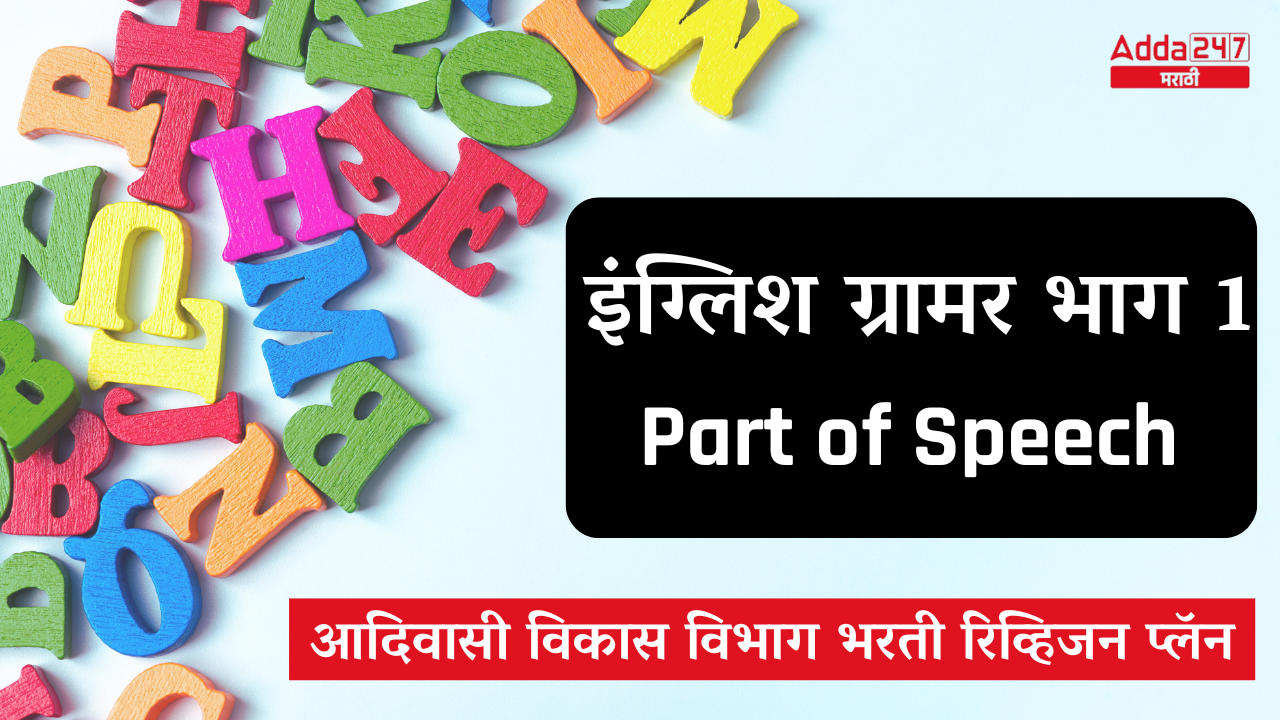Table of Contents
English Grammar for Competitive Exams: Part of Speech
English Grammar for Competitive Exams: Part of Speech: प्रत्येक शब्द हा Part of Speech चा भाग आहे. इंग्लिश ग्रामर मध्ये इंग्लिश मधील प्रत्येक शब्द हा वेगवेगळ्या Part of Speech मध्ये विभागल्या गेला आहे. English मध्ये एकूण आठ Part of Speech आहेत.
- Noun – नाम
- Pronoun -सर्वनाम
- Adjective – विशेषण
- Verb – क्रियापद
- Adverb – क्रियाविशेषण
- Preposition – शब्दयोगी अव्यय
- Conjunction – उभया नववी अव्यय
- Interjection – केवल प्रयोगी अव्यय
English Grammar for Competitive Exams: Noun
English Grammar for Competitive Exams: Noun (नाम): नाम हे व्यक्तीच्या, ठिकाणाच्या किंवा वस्तूंच्या नामासाठी वापरले जाते. आपण कुठल्याही दिशेने पाहिले असता आपल्याला काही ना काही दिसत असते त्या दिसलेल्या वस्तूला आपण ज्या शब्दाने बोलतो तो शब्द म्हणजे नाम.
A noun is a person, place, concept, or object. Basically, anything that’s a “thing” is a noun, whether you’re talking about a basketball court, San Francisco, Cleopatra, or self-preservation.
Types of Noun
- Proper Noun (विशेष नाम)
- Common noun (सामान्य नाम)
- Collective noun (समुदाय वाचक नाम)
- Material noun (पदार्थवाचक नाम)
- Abstractive noun (भाव वाचक नाम)
Proper Noun: विशिष्ट व्यक्ती तळ यांच्या ठेवलेल्या नावाला Proper Noun असे म्हणतात Eg. Gopal, Himalaya
Common noun: एका वर्गातील किंवा प्रकारातील सर्व व्यक्तींना, किंवा वस्तूंना जे नाव दिले जाते त्याला Common noun असे म्हणतात Eg. Man, Book
Collective noun: व्यक्तींच्या, प्राण्यांच्या किंवा वस्तूंच्या एकत्रित समूहाला दिलेल्या नावाला Collective noun असे म्हणतात Eg. army, herd, class
Material noun: पदार्थ (वस्तू, साहित्य इ) यांच्या नामाला Material noun म्हणतात. Eg. gas, wood
Abstractive noun: ज्या नामामुळे प्राण्यातील किंवा पदार्थातील एखाद्या गुणांचा किंवा धर्माचा बोध होतो त्याच Abstractive noun असे म्हणतात. (Abstractive noun हे प्रत्यक्षात दिसत नाही.) Eg. honesty, wisdom, generosity
English Grammar for Competitive Exams: Pronoun
English Grammar for Competitive Exams: Pronoun (सर्वनाम) : नामा ऐवजी येणाऱ्या शब्दात सर्वनाम असे म्हणतात. सर्वनाम म्हणजे नामाची पुनरावृत्ती टाळण्यासाठी नामाऐवजी वापरला जाणारा शब्द आहे.
Pronouns are the words you substitute for specific nouns when the reader or listener knows which specific noun you’re referring to.
Types of Pronoun
- Personal Pronouns (पुरुषवाचक सर्वनाम)
- Interrogative Pronouns (प्रश्नार्थक सर्वनाम)
- Demonstrative Pronoun (दर्शक सर्वनाम)
- Indefinite Pronoun (अनिश्चित सर्वनाम)
- Relative Pronoun (संबंधित सर्वनाम -संबंध दर्शक सर्वनाम)
- Reflexive Pronouns/ Emphatic Pronouns (आत्मवाचक सर्वनाम)
- Distributive Pronoun (विभाजक सर्वनामे)
Personal Pronouns: याचे तीन उपप्रकार आहेत
| Personal Pronouns | एकवचनी (Singlular) | अनेकवचनी (Pural) |
| प्रथम पुरुष | I, me, my | we, us, our |
| द्वितीय पुरुष | You | You, Your |
| तृतीय पुरुष | He, she, It | They |
Interrogative Pronouns: ज्या सर्वनामांचा प्रश्न विचारण्यासाठी वापर होतो त्यांना Interrogative Pronouns असे म्हणतात Eg who, what, where,when.
Demonstrative Pronoun: कोणतीही जवळची किंवा दूरची वस्तू दर्शवण्यासाठी Demonstrative Pronoun याचा उपयोग होतो Eg these that, this, those,such
Indefinite Pronoun: ही सर्वनाम निश्चित व्यक्ती किंवा वस्तू यांचा उल्लेख करत नाहीत. Eg, some, many, all,few, any
Relative Pronoun: वाक्यात पुढे येणाऱ्या दर्शक सर्वनाम आशी संबंध दाखवणाऱ्या सर्वनामला संबंधित सर्वनामे असे म्हणतात. Eg what , who
Reflexive Pronouns/ Emphatic Pronouns: आपण व स्वतः यांना Reflexive Pronouns/ Emphatic Pronouns असे म्हणतात. हे सर्वनाम वाक्याच्या सुरुवातीला कधीच येत नाही. Eg . myself, youself, herself
Distributive Pronoun: एका वेळी एकाच व्यक्तीचा उल्लेख करण्यासाठी Distributive Pronoun वापरतात. Eg. either, neither, each
English Grammar for Competitive Exams: Adjective
English Grammar for Competitive Exams: Adjective (विशेषण): विशेषण हे नामा बद्दल अधिक माहिती सांगते. नामा बद्दल किंवा सर्व नामा बद्दल माहिती सांगणारा शब्द म्हणजे विशेषण होय.
Adjectives are the words that describe nouns.
Types of Adjective with Example
- Adjectives of quality (गुणविशेषण) eg. kind, generous, poor
- Adjective of quantity (परिणाम वाचक विशेषण) eg. few, all, much
- Interrogative adjectives (प्रश्नार्थक विशेषण) eg. what, which
- Possessive adjectives (स्वामित्व दर्शक विशेषण) eg. your, her, hits
- Demonstrative adjectives (दर्शक विशेषण) eg. what, which
- Distributive adjectives (विभाजक विशेषण) eg. each, Every
- Exclamatory adjectives (उद्गारवाचक विशेषण) eg. what, an Idea!
- Proper adjectives (विशेष विशेषणे) eg. Indian, Australian
- Emphasizing adjective (परिणाम दर्शक विशेषणे) eg. own, very
- Adjective of number (संख्या विशेषण) Cardinals – one, two, three
Ordinals – first, second, third
English Grammar for Competitive Exams: Verb
English Grammar for Competitive Exams: Verb (क्रियापद): क्रियापद हे वाक्याचा अर्थ पूर्ण करते
क्रियापदाचा उपयोग करून क्रिया किंवा कृती, अस्तित्व किंवा स्थिती, इच्छा, हुकुम, भावना इत्यादी व्यक्त करता येते
These bolded words are verbs. Verbs are words that describe specific actions, like running, winning
Types of Verb
- Transitive verbs
- Intransitive verbs
- Auxiliary verbs
Transitive Verbs (सकर्मक क्रियापद): या क्रियापदाला काय नाही प्रश्न विचारले असता कर्म (Object) मिळते,त्या क्रियापदाला Transitive verbs असे म्हणतात
Eg. 1.Gopal wrote a letter
2.Muhammad told a story
Intransitive Verbs (अकर्मक क्रियापद): ज्या क्रियापदाला अर्थपूर्ण होण्यासाठी कर्माची (Object) आवश्यकता भासत नाही त्त्याला Intransitive verbs असे म्हणतात.
Eg. He writes
The dog barks
Auxiliary Verbs (साहाय्यकारी क्रियापद): मुख्य क्रियापदाला मदत करणाऱ्या क्रियापदाला साह्यकारी क्रियापद असे म्हणतात. जेव्हा धातुसाधित व क्रियापद हे दोन्ही मिळून एकाच क्रियांचा बोध होतो तेव्हा धातुसाधित याला मदत किंवा सहाय्य करणाऱ्या क्रियापदाला साह्यकारी क्रियापद असे म्हणतात.
1. Primary auxiliary Verb
A. to be type – am, is, are, was, were
B. Have type- has, have, had
C. do type – do, does
2. Modal auxiliary Verb
eg. Will, would, can, could, may, might, should, must, ought, etc.
English Grammar for Competitive Exams: Adverb
English Grammar for Competitive Exams: Adverb (क्रियाविशेषण): क्रियाविशेषण हे क्रियापदाचा अर्थ विशेषणाचा अर्थ किंवा दुसऱ्या क्रिया विशेषणाचा अर्थ सांगण्यासाठी वापरतात.
An adverb is a word that describes an adjective, a verb, or another adverb.
Types of Adverb with Example
- Adverbs of time (कालवाचक क्रियाविशेषण) eg. tomorrow, today, then
- Adverbs of manners. (रिती वाचक क्रियाविशेषण) eg. fast, slowly.
- Adverbs of place (स्थलवाचक क्रिया विशेषण) eg. Here, above, below.
- Adverbs of affirmation and negation (निश्चयात्मक क्रियाविशेषण) eg. surely, definitely, certainly
- Adverb of frequency (पुनरावृत्तीदर्शक क्रियाविशेषण) eg. twice, after, once
- Adverbs of reason (कारण दर्शक क्रियाविशेषण) eg. Hence, since, therefore, because.
- Interrogative adverb (प्रश्नार्थक क्रियाविशेषण)
- 1. Place -where
2. Number- how many, how often.
3. Time- when, how long.
4. Reason – why
5. quantity- How much, how far
6 Manner – how - Relative adverb (संबंध दर्शक क्रियाविशेषण) eg. when, how, why, where.
English Grammar for Competitive Exams: Preposition
English Grammar for Competitive Exams: Preposition (शब्दयोगी अव्यय): शब्दयोगी अव्यय हे नाम किंवा सर्वनाम बरोबर एखादी वस्तू किंवा व्यक्ती दर्शवण्यासाठी आणि नाम किंवा सर्व नामाचा इतरांशी संबंध ठेवण्यासाठी वापरतात.
Prepositions tell you the relationship between the other words in a sentence.
Kinds of Prepositions
- Simple preposition (साधे शब्दयोगी अव्यय) eg. by, to, for, from, on, with
- Preposition for place (दर्शक शब्द योगी अव्यय) eg. among, under, between
- Preposition Of Manner (रिती वाचक शब्दयोगी अव्यय )eg. With, of
- Preposition of reason (कारण दर्शक शब्दयोगी अव्यय) eg. for, with
- Preposition of time (कालदर्शक शब्दयोगी अव्यय) eg. before, till, after
- Possessive preposition (स्वामित्व दर्शक शब्दयोगी अव्य eg. of,
- Preposition of direction (दिशादर्शक शब्दयोगी अव्यय) eg. by, towards, around.
English Grammar for Competitive Exams: Conjunction
English Grammar for Competitive Exams: Conjunction (उभयान्वयी अव्यय): उभयान्वयी अव्यय यांचा वापर वाक्य किंवा शब्द जोडण्यासाठी केला जातो
A word that is used for joining other words, phrases, or sentences.
Main Type of Conjunction
- Coordinating conjunction (प्रधान्त्व सूचक उभयान्वयी अव्यय)
- Sub ordinate conjunction (गौणत्व सूचक उभयान्वयी अव्यय)
Coordinating conjunction: and, both— and, not only- but also, neither- nor, either- or, also, hence, therefore
Subordinate conjunction: if, unless, if only, when, till, because, as/so…as, whose, whom, still, so that
English Grammar for Competitive Exams: Interjection
English Grammar for Competitive Exams: Interjection: आपल्या मनातील दुःख, आश्चर्य इत्यादी भावना व्यक्त करणाऱ्या शब्दांच्या केवलप्रयोगी अव्यय किंवा उदगार वाची शब्द असे म्हणतात,
A word or phrase that is used to express our expression. eg. Alas, Hurrah, Wow, Oh, Ouch, Bravo, etc
महाराष्ट्रातील सर्व स्पर्धा परीक्षांसाठी ऑनलाईन क्लास, व्हिडिओ कोर्स, टेस्ट सिरीज, पुस्तके आणि इतर अभ्यास साहित्य खाली दिलेल्या लिंक वर क्लिक करून मिळावा.














